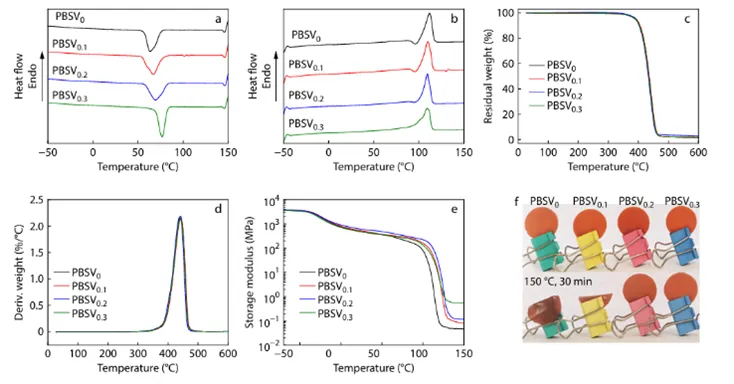
Breaking Barriers in Polymer Technology: PBS Vitrimers Paving the Way for a Greener Future!
2024-12-27
Author: Li
Introduction
In a groundbreaking achievement for sustainable materials, researchers have made notable advancements in poly(butylene succinate) (PBS), a biodegradable polyester that offers a promising alternative to traditional plastics. By integrating dynamic imine bonds into the polymer matrix, scientists have successfully enhanced the properties of PBS, overcoming its previous limitations and making it more suitable for diverse applications across various industries.
Environmental Benefits of PBS
PBS is celebrated for its environmental benefits—under composting conditions, it can decompose into harmless byproducts such as water, carbon dioxide, and biomass. Its resemblance to polypropylene in terms of physical properties makes it an attractive substitute. However, previous iterations of PBS faced significant challenges, particularly in manufacturing processes like foaming and film blowing, primarily due to issues with melt viscosity and mechanical strength. This new research marks a significant leap forward in addressing these challenges.
Collaboration and Innovation
A collaborative team from Southwest University and South China University of Technology has been at the forefront of this innovation. Their recent publication details how the introduction of dynamic imine bonds has led to the creation of PBS vitrimers (PBSVs). These vitrimers not only enhance the thermal and mechanical properties of PBS but also improve its melt characteristics, thus broadening its potential applications in eco-friendly materials.
Research Results and Performance
The research results are impressive; the team was able to adjust crosslinking degrees within the polymer to develop PBSVs that exhibit remarkable improvements in performance. Notably, these new vitrimers demonstrated outstanding thermal reprocessability, with more than 90% recovery of mechanical properties after three processing cycles. Furthermore, increasing the crosslinking degree appears to accelerate crystallization rates, enhancing overall performance. Unlike traditional crosslinked polymers, PBSVs maintain high viscosity and strength during processing, leading to more durable and sustainable alternatives to conventional plastics.
Expert Insight
Jian-Bing Zeng, the lead investigator, expressed excitement about the implications of this research, stating, “This work is crucial for advancing the field of polymer science. We have successfully engineered vitrimers that hold onto the sustainable and biodegradable qualities of PBS while significantly improving performance. These advancements open doors for the wider use of biodegradable materials, presenting substantial environmental benefits by providing efficient alternatives to non-degradable plastics.”
Potential Applications
The potential applications for enhanced PBSVs are vast—ranging from eco-friendly packaging to foam materials and disposable products. With their improved properties and reprocessability, PBSVs could revolutionize the production of sustainable materials, helping to mitigate environmental pollution. As industries increasingly focus on sustainability, the adoption of these innovative materials is expected to reduce the ecological footprint of the plastics industry and support a transition toward a circular economy, where recycling and reuse become the norm.
Conclusion
This pioneering research not only signifies a monumental step in the realm of biodegradable materials but also showcases the potential for a greener future. As we continue to confront the challenges of plastic pollution, advancements like PBS vitrimers might just be the key to transforming how industries approach material production. Stay tuned as this story develops, because the future of sustainable materials is bright, and you won't want to miss what comes next!


 Brasil (PT)
Brasil (PT)
 Canada (EN)
Canada (EN)
 Chile (ES)
Chile (ES)
 Česko (CS)
Česko (CS)
 대한민국 (KO)
대한민국 (KO)
 España (ES)
España (ES)
 France (FR)
France (FR)
 Hong Kong (EN)
Hong Kong (EN)
 Italia (IT)
Italia (IT)
 日本 (JA)
日本 (JA)
 Magyarország (HU)
Magyarország (HU)
 Norge (NO)
Norge (NO)
 Polska (PL)
Polska (PL)
 Schweiz (DE)
Schweiz (DE)
 Singapore (EN)
Singapore (EN)
 Sverige (SV)
Sverige (SV)
 Suomi (FI)
Suomi (FI)
 Türkiye (TR)
Türkiye (TR)
 الإمارات العربية المتحدة (AR)
الإمارات العربية المتحدة (AR)